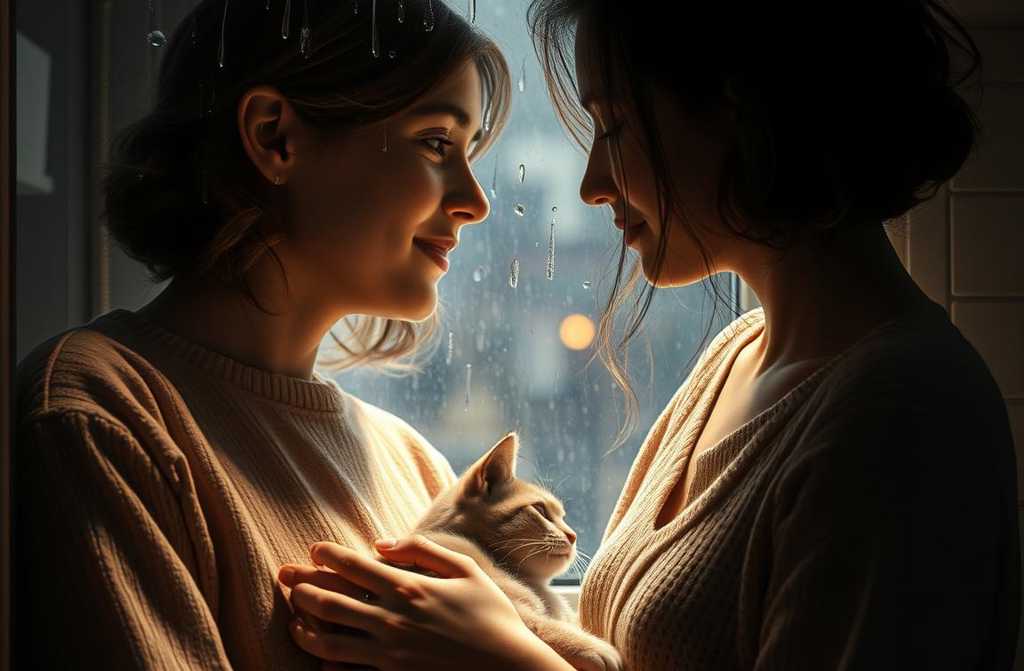“Go away. I’m tired of being your backup plan,” I said, switching off the hall light.
Andrew stood frozen in the doorway, as if he couldnt believe I meant it. He hesitated, peering into the darkness like he might find an answer there, or at least a hint of forgiveness.
“Emily… you know it’s not that simple.”
“Go,” I repeated, quieter but just as firm.
He left without a word, careful not to slam the doorjust a soft click of the latch, almost apologetic. I didnt need the light to find my way to the kitchen. My fingers traced the familiar paththe kettle, the mug Id used for coffee earlier. My hands shook, so I gripped the cup tighter, knuckles whitening like theyd been pressed into snow.
It felt like Id torn something vital out of myself, something alive, something Id grown used to, even if it never brought me joy.
In the hallway, Whiskers, my tabby, let out a plaintive meow. I called to her absently:
“Come here, fluffball, come to me…”
She didnt. She curled into a tight ball by the door, already sensing the shift in the air.
Silence settled over the kitchen table. The tea in my cup cooled too fast. I stared at the tiles, wondering when it all began and why it had dragged on so long.
It started, as these things do, with flowers. He brought them once, grinning. “Missed you,” hed said. Id missed him too. Back then, I still believed you could just miss someone without dissecting where theyd been the night before.
He didnt come often. But when he did, it was like he was swooping in to save the dayexhausted from work, full of excuses. “You know how things are at home,” hed say.
“I dont expect anything from you, Andrew,” I told him once, as he sprawled on my sofa, shoes off, feet up.
“Dont lie,” he replied. “You want me to stay for good. And I cant.”
“I know.”
But I waited anyway. And when he came, I was glad. I kept a razor for him, bought his favourite cheddar and wine even though I didnt drink. Hed eat, sleep, leave. Sometimes with a kiss, sometimes without.
Once, he stayed three days. For the first time, I let myself hope: maybe this time? But on the fourth day, his wife called. He answered curtly, nodded, dressed, apologised.
“You know shes unwell. Her heart. I cant just abandon her.”
“Youre not abandoning anyone. Ive never asked you to.”
“Dont lie.”
He left. And I waited again.
Once a month, wed drive to his grandmothers cottage in the Cotswolds. There, he was differentwarmer, softer, real. We planted radishes in the garden, he fixed the leaky roof, and at night, we talked by the hearth.
One afternoon, as I hung laundry, an elderly neighbour wandered over.
“Is this your wife?” she asked Andrew.
He faltered. I stood there, wringing out a pillowcase.
“Well… not exactly,” he finally said.
“Oh,” the woman nodded, as if that explained everything.
I didnt react, but I barely spoke on the drive home. He filled the silence with chatter about work, the weather, his son.
His son. Sixteen. Id never met him. Andrew called him “a good lad, just complicated.” His wife was always in and out of hospital, fragile, unraveling. He said he couldnt “make things worse for her now.”
“And what about me?” I snapped once.
“Youre strong. Youll manage.”
That was the difference. She was illshe needed pity. I was strongI could wait on the bench.
After that night, I changed. No more ironing his shirts “just in case.” No more making his favourite stew. When he asked, “Whats for dinner?” Id shrug: “Check the fridge.”
“Youve changed,” he said. “You used to be different.”
“I used to believe youd stay. Now I dont. Now I just live.”
He sulked, left. Came back three weeks later, drunk, with roses. “I get it. Youre right. But I cant.”
“And I wont anymore.”
He didnt understand. CalledI didnt answer. Showed upacted like nothing happened. I let him in. That night repeated like all the others: wine, talking, sleepless hours. Morning came; he left.
I sat at the table and made a list. Not chores, not groceries. A list of what Id given him. My patience. My tenderness. My days, my evenings, my energy. My love. And beside itwhat Id gotten.
Nothing.
I underlined it. Stared out the window. Whiskers leapt into my lap, and I whispered:
“Enough.”
When he arrived today, I already knew what Id say.
He shed his coat, set a bag on the table.
“Just dropping by. That okay?”
I said nothing.
“Whats with you?” he asked, sensing the chill.
“Go.”
He froze.
“What?”
“Go. Im tired of being your backup. Im not a spare jumper you pull on when your favourites in the wash.”
He stepped closer.
“Em, come on. Youre overthinking. Were drawn to each other. Isnt that what matters?”
“Drawn? You come when youre miserable. When theres a row at home, when shes ill, when youre lonely. When things are good, youre with her.”
“But you know I cant just”
“And I cant do this anymore.”
He went quiet. Tried to hug me; I stepped back. He sank onto the sofa.
“You need me.”
“Youre in my way. I cant build a life while you drift in and out. Im afraid to fall for someone else, afraid to upset you, afraid youll return and Ill come running like a fool.”
He stared, as if seeing me for the first time.
“You really want me to leave?”
“I want to live.”
He stood. Walked to the door slowly, like he hoped Id stop him. I didnt.
He shrugged on his coat, turned.
“Goodbye, then.”
“Goodbye, Andrew.”
The door shut. I counted to ten. The hall light was still on. I switched it off.
Whiskers padded over, purring. I sat on the sofa, stroked her back.
“Its done,” I said aloud. “Im free.”
Outside, the wind moaned. A streetlamps reflection shivered in the window. And in that quiet, there was no fearjust lightness. For the first time in years.
I woke early, as usual. Dawn hadnt broken, but the room was softening. I stretched, yawned, and before opening my eyes, knewthe flat was silent. No unfamiliar breath beside me, no cologne, no rustle of a bag with “something sweet.”
I made tea. Whiskers wound around my ankles, waiting for breakfast. Everything was the same, yet entirely different.
As I poured my tea, it struck me: Andrew probably thought, “Shell crack and call.” Maybe he waited. But no call came.
My phone lay dark on the table. No texts, no missed calls. I sighed. Not that I expected… but still.
Work helped. I fell into routine: morning bus, office, reports, kitchen chatter, gossip, evening train home.
The girls at work had suspicions. Knew there was someone, but I never shared details.
“Em, you look brighter,” Lena from accounts remarked one day.
“Just rested,” I shrugged. “No mysteries.”
Yet sometimes, I caught myself listening for footsteps on the stairs. Just in case. But they always passed. Or they werent his.
I called Mum more. Before, it was sporadic; now, almost daily. Strangely, she never probed, just listened.
“Long as youre not sad, love. Youll be alright. Youre tough.”
One evening, I took a walk. Past the bakery where wed bought cakes, down the lane where hed kissed me, laughing as I complained about cold hands. I was surprisedno pang, no ache, just a faint echo.
I sat on a bench. Kids played nearby. Parents chatted, argued, laughed. Two weeks had passed, yet it felt like a lifetime.
“Emily?”
I looked up. Dan, an old uni mate, stood there, squinting and smiling.
“Blimey, it is you! Thought I was seeing things.”
“Hi,” I said, smiling wider than Id expected. “Ages, isnt it?”
“







